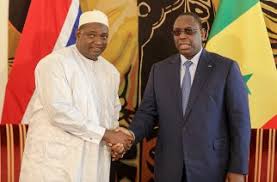Gambia joins Senegal in combating illegal timber trade

Gambia and Senegal have started a joint initiatives to combat illegal timber trade in Casamance, Senegal’s troubled south that has been dealing with rebellion since in the 1980s.
The Gambian leader Adama Barrow told journalists on Tuesday that he and his Senegalese counterpart Macky Sall are doing everything to combat illegal logging.
Casamance, the southern Senegalese region, is known for illegal timber trade, a business believed to be controlled by rebels.
Dakar has long been seeking Gambia’s cooperation to combat the issue but it could not have the blessing of the former ruler Yahya Jammeh.
“Myself and President Sall, we are doing everything to stop this illegal logging… We even have security forces stationed at the (timber) landing sites… It is costing us between two to three million dalasi to fund those forces who are permanently stationed at those landing sites… This (logging activity) is illegal,” Barrow told journalists at a press conference on Tuesday.
Though The Gambia has a little forest cover and has banned illegal logging for some time now, timber export from the small country is only next to Nigeria in size.
In 2015, an ecologist and former Senegalese Environment Minister Haidar El Ali revealed that export of wood from The Gambia amasses more than USD $238 million.
Experts say the illegal logging has over the years strengthened the rebellion in Casamance since it serves as a major source of the revenue for the insurgents.
Forty percent of Senegal is covered by forest, most of it in its Casamance region. 20 percent of this is its primary forest. Senegal’s Casamance has 30,000 hectares of forest remaining and The Gambia just 4,000 hectares.
All of the timber exported out of The Gambia primarily to China is from Senegal and Bissau; making all of the timber exported from The Gambia illegal, experts said.
Casamance has lost more than a million trees and from 2010 to 2013, according to experts.
60% of China’s import of timber is from Africa and nearly half of this, about 31 percent of its total imports is from The Gambia.


Comments are closed.